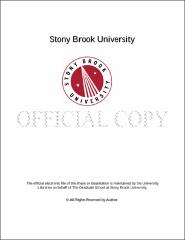| dc.identifier.uri | http://hdl.handle.net/11401/76876 | |
| dc.description.sponsorship | This work is sponsored by the Stony Brook University Graduate School in compliance with the requirements for completion of degree. | en_US |
| dc.format | Monograph | |
| dc.format.medium | Electronic Resource | en_US |
| dc.language.iso | en_US | |
| dc.publisher | The Graduate School, Stony Brook University: Stony Brook, NY. | |
| dc.type | Dissertation | |
| dcterms.abstract | Identity, which remains a central theme for contemporary Caribbean and diaspora artists, exists in tension with a long tradition of stereotypes and tropes employed by its colonizers to describe the region through the construction of difference and otherness. The European myth of " discovery" fashioned the Caribbean as an uncivilized paradise, constructed in contrast to the normative of Western modernism. The Caribbean is compelled then to repeatedly assert its identity as well as its contemporaneity within a highly contested and over-determined space. The model of diaspora positions the Caribbean within a transnational space of dynamic cultural exchange, emphasizing the experience of travel, whether forced or voluntary and the encounter of difference. The transatlantic journeys with their vertiginous consequences were a defining feature of modernity. Estrangement and displacement emerge as a recurring creative force which has impacted contemporary artistic practice within the diaspora and requires new methodological approaches of interpretation. A " re-turn" is proposed as a reconfiguring turn, a critical break or deflection which re-examines historical narratives and results in a paradigm shift. Four moments are proposed for consideration within a diasporic genealogy aimed at interrogating the past-present continuum to refigure the past, illuminate absences and develop methodological approaches that provide an expanded context in which to look at contemporary Caribbean art. The contemporary work of Sonia Boyce provides a model for re-assessing diaspora experience; the late sixteenth century illustrations of travel journals by Flemish book publishers, the De Brys were unprecedentedly influential in disseminating a constructed vision of the earliest transatlantic encounters; French post-impressionist Paul Gauguin re-framed his experiences of Martinique in the Volpini Suite through memory, allegory and myth; and Wifredo Lam and Aimé Césaire re-deployed surrealism's language of conceptual revolution and aesthetic juxtaposition to foreground the African presence as a constituent part of Caribbean experience. Questions of language and authority as represented through the intersection of words and images recur throughout these examples. These four moments present an expanded spatial and temporal context in which to rethink the interpretation of work by four contemporary artists in Barbados beyond previously established nationalist paradigms. | |
| dcterms.abstract | Identity, which remains a central theme for contemporary Caribbean and diaspora artists, exists in tension with a long tradition of stereotypes and tropes employed by its colonizers to describe the region through the construction of difference and otherness. The European myth of " discovery" fashioned the Caribbean as an uncivilized paradise, constructed in contrast to the normative of Western modernism. The Caribbean is compelled then to repeatedly assert its identity as well as its contemporaneity within a highly contested and over-determined space. The model of diaspora positions the Caribbean within a transnational space of dynamic cultural exchange, emphasizing the experience of travel, whether forced or voluntary and the encounter of difference. The transatlantic journeys with their vertiginous consequences were a defining feature of modernity. Estrangement and displacement emerge as a recurring creative force which has impacted contemporary artistic practice within the diaspora and requires new methodological approaches of interpretation. A " re-turn" is proposed as a reconfiguring turn, a critical break or deflection which re-examines historical narratives and results in a paradigm shift. Four moments are proposed for consideration within a diasporic genealogy aimed at interrogating the past-present continuum to refigure the past, illuminate absences and develop methodological approaches that provide an expanded context in which to look at contemporary Caribbean art. The contemporary work of Sonia Boyce provides a model for re-assessing diaspora experience; the late sixteenth century illustrations of travel journals by Flemish book publishers, the De Brys were unprecedentedly influential in disseminating a constructed vision of the earliest transatlantic encounters; French post-impressionist Paul Gauguin re-framed his experiences of Martinique in the Volpini Suite through memory, allegory and myth; and Wifredo Lam and Aimé Césaire re-deployed surrealism's language of conceptual revolution and aesthetic juxtaposition to foreground the African presence as a constituent part of Caribbean experience. Questions of language and authority as represented through the intersection of words and images recur throughout these examples. These four moments present an expanded spatial and temporal context in which to rethink the interpretation of work by four contemporary artists in Barbados beyond previously established nationalist paradigms. | |
| dcterms.available | 2017-09-20T16:51:22Z | |
| dcterms.contributor | Goodarzi, Shoki | en_US |
| dcterms.contributor | Frank, Barbara E | en_US |
| dcterms.contributor | Monteyne, Joseph | en_US |
| dcterms.contributor | Mirzoeff, Nicholas. | en_US |
| dcterms.creator | Thompson, H. Allison | |
| dcterms.dateAccepted | 2017-09-20T16:51:22Z | |
| dcterms.dateSubmitted | 2017-09-20T16:51:22Z | |
| dcterms.description | Department of Art History and Criticism. | en_US |
| dcterms.extent | 391 pg. | en_US |
| dcterms.format | Application/PDF | en_US |
| dcterms.format | Monograph | |
| dcterms.identifier | http://hdl.handle.net/11401/76876 | |
| dcterms.issued | 2015-08-01 | |
| dcterms.language | en_US | |
| dcterms.provenance | Made available in DSpace on 2017-09-20T16:51:22Z (GMT). No. of bitstreams: 1
Thompson_grad.sunysb_0771E_11489.pdf: 23658109 bytes, checksum: ced207239290a336682a3b916f933851 (MD5)
Previous issue date: 2013 | en |
| dcterms.publisher | The Graduate School, Stony Brook University: Stony Brook, NY. | |
| dcterms.subject | Art, Barbados, Caribbean, Culture, Diaspora, Visual | |
| dcterms.subject | Art history | |
| dcterms.title | Pronouncing the Re-Turn: Constructing and interpreting visual representations of the Caribbean from a transatlantic, transcultural and diasporic perspective | |
| dcterms.type | Dissertation | |

